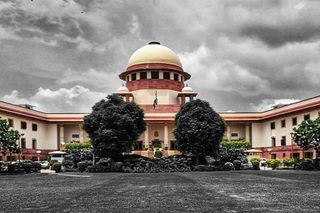
Indian Women Seeking Abortions Are Petitioning the Courts, Even When They Don’t Need To
By continuing to hear petitions for abortions that are within the legal limits, the judiciary is furthering misinformation around the MTP Act.

In the past three years, there has been an increasing and worrying trend of pregnant women approaching courts of law, either directly or indirectly, seeking permission for terminating the pregnancy that they are carrying.
Initially, these were all cases that were above the 20-week limit that the Medical Termination of Pregnancy (MTP) Act sets out. However, a recent study by the Pratigya Campaign shows that even cases of gestational age at 8 weeks and 12 weeks have gone to court seeking permission.
In our country, the criminal law, i.e. the Indian Penal Code, makes causing a miscarriage an offense, even with the consent of the pregnant woman. It is as an exception to this general rule that the MTP Act was enacted. The Act permits termination of pregnancies in certain conditions, by certain medical practitioners, at certain places and till a certain time. Within the MTP Act also lies the exception to conduct a termination at any time by a single recognized medical practitioner where it is immediately necessary to save the life of the pregnant woman.
Fifty years after its enactment, the provisions in the MTP Act are turning out to be obstacles in the path for women to access safe and legal abortion services.
Even though all of these cases were allowed, the fact that they reached court points towards the difficulties women face while accessing abortion.
This is because of one key flaw in the Act: the 20-week gestation limit. This limit is no longer cognizant of the social realities in our country or the evolving technologies. Most often, the women who approach the court do so under traumatic circumstances — for example, if they became pregnant as a result of rape and were unable to come forward earlier, or if an abnormality was detected in the fetus at a later stage in the pregnancy. Compelling such women to go to courts only adds to their trauma and can create delays that result in abortion no longer being medically viable.
In a report recently published by the Pratigya Campaign, an analysis of 194 cases that have gone to court between June 2016 and April 2019 was done. Out of the 194 petitions, about 10%, or 21 cases (including one Public Interest Litigation), went to Supreme Court, while 90%, or 173 cases, were filed at various High Courts. All cases petitioned at the Supreme Court were above 20 weeks of gestation, five of which were rape cases and 15 involved cases of fetal abnormalities. The Supreme Court denied five cases and permitted 15 MTP requests. Among the five cases denied by the court, three involved fetal abnormalities, where each case had a fetus between 26 to 28 weeks’ gestation. The Supreme Court followed the opinion of the medical boards set up to examine the woman to decide the judgment in these cases.
Out of the 173 cases before the High Courts in India, MTPs were permitted in 80% of the cases and denied in 16% of the cases; the remaining were withdrawn. Among all High Courts, the Bombay High Court witnessed the largest share of petitions with 88 women appearing before the court. The study found that 23% of the cases, that is, 40 women who petitioned the high courts, were below 20 weeks of gestation. This is an alarming development as it marks a departure from the provisions of the MTP Act, which allows medical termination of pregnancies up to 20 weeks’ gestation. A notable number of cases under 20 weeks were a result of rape. Even though all of these cases were allowed by the court, the fact that they reached court is a cause of worry and points towards the difficulties women face while accessing abortion.
Related on The Swaddle:
Abortions: Visualizing the Data on One of the Most Fraught Topics in Women’s Healthcare
The 20-week limit is just one piece of the puzzle. Fundamentally, the MTP Act fails to recognize women’s constitutional right to privacy. Ironically, two years ago, the same Supreme Court that heard many petitions seeking permission for termination of pregnancy gave us a foundation for ensuring women’s reproductive rights in India. The Right to Privacy judgment, which many tend to associate with AADHAR, clearly held that the right to privacy is an intrinsic part of the right to life and personal liberty under Article 21 of the Constitution. It spoke definitively about abortion rights: it held that a woman has a constitutional right to make reproductive choices as an ingredient of her personal liberty under her right to life and her right to privacy, dignity and bodily integrity. Yet, the law governing abortion in India does not respect women’s personal liberty because it does not allow abortion at her request, which many other countries do. It continues to recognize only the medical opinion of the registered medical practitioner and does not consider the choice of the woman. Yes, for termination to take place based on medical opinion, the consent of the pregnant woman is non-negotiable, but her consent is of no consequence if the registered medical practitioner does not opine that the pregnancy comes with the realm of termination.
Additionally — and unfortunately — while the right to privacy judgment goes to great lengths to argue and hold that right to privacy is a fundamental right, it stops short of specifying the manner in which that right will be implemented and ensuring that the right is not being violated.
The consequences of India’s dated abortion law are severe. When women cannot access safe and legal abortion, they often turn to unsafe sources for termination of pregnancy. And today, unsafe abortion is responsible for approximately 8% of women’s deaths around pregnancy, making it the third -cause of maternal mortality.
Amendments to the MTP Act have been proposed and would address many of the challenges, including by allowing abortion on request up to 12 weeks and by extending the 20-week limit. Such amendments could go a long way in ensuring more women are able to exercise their constitutional right to privacy and help stop unsafe abortions. But meanwhile, the courts dealing with these cases can ensure — in their writ jurisdictions — that this process is as smooth as possible for a woman before them, and all others who will be impacted.
Of course, improving the law is only part of the picture. Societal stigma, a lack of awareness and availability of services similarly prevent women from accessing safe abortions. Only when we address these gaps alongside legal changes can we uphold every woman’s right to decide whether and when to have children.
Anubha Rastogi is a lawyer with a diverse combination of litigation capabilities and proficiency and 15 years in providing survivors of human rights violations access to justice, with a specialized focus on gender rights (especially women’s rights and their access to safe abortion).
Related


Could an Apology Cause Its Recipients More Harm Than Good? Perhaps.
